#no diminutives in the english dub mind you!! i checked!!
Explore tagged Tumblr posts
Text
you guys. in the czech dub of the game, henry calls hans nicknames and more importantly, diminutives during the scramble after they get ambushed on their way to nabákov. im. soft
#no diminutives in the english dub mind you!! i checked!!#czech hansry truthers we win again in a new way#t4lx.txt#kingdom come deliverance spoilers#kingdom come deliverance 2 spoilers#kcd2 spoilers#LIKE. FYM#JANDO#HONZO???????#THE WAY I SCREAMED#i still CANNOT fucking believe this is actually happening.#mr wágner doing the lords work as jindřich#and also whoever at warhorse wrote those dialogues and made the decisions to put those diminutives there. Perfection#made the scene even more loaded with feelings and worry and protectiveness and also communicated that the lads relationship is way more th#than just lord and servant. im this essay i will start sobbing if i keep thinking about them at this point
73 notes
·
View notes
Text
Another part of finding differences between polish and english dub of ninjago! As promised, today I'm dissecting the first season!
But before we get to that, some language quirks that may need to be explained:
Diminutive and Augmentative.
Diminutive (or in short DIM) is used to change the word, to express different meanings. You use it to point out somethings small size or your affection and tenderness towards it; often used to create pet names and nicknames (think cat → kitty, mom → mommy, Charles → Charlie). Sometimes used as an insult, usually in sarcasting light.
Augmentative (in short AUG) is the opposite of that: used to point out bigger size, dislike, make an insult or a joke. It usually has negative emotions attached to it. There are few exceptions, but those mostly rely on context.
For simplicities sake, DIM → affectionate; small. AUG → insulting; big. Keep these in mind, as they'll be popping up in here and in the future.
Previous Masterpost Next
With that out of the way, let's begin!
Rise of the Snakes | Rok węży (Year of the snakes)
I've wondered for some time why this change was made, and the only conclusion I came up with is that translating 'Rise', would remind people of things like uprisings or revolutions. That being said, I don't mind this change.
1. Rise of the Snakes | Atak Węży (Attack of the Snakes)
• In english the word 'prophecy' is being explained, but in polish the ”fancier” synonym of prophecy is used (proroctwo), and the explanation is basically 'this word means prophecy' (przepowiednia).
• Jay: "Did I say Green Ninja? I meant lean ninja!" → "Miałem na myśli strapiony ninja!" (I meant distressed ninja!)
• Jay: "Nya, you're okay!" → "Nya, ty żyjesz!" (You're alive!)
2. Home | Dom
• Kai: "You mean you never had a home?" → "Nie masz domu?" (You don't have a home?) What's also interesting here is that in polish is there's no difference between home and house. So you could understand it as "You don't have a house?" and it wouldn't be wrong.
• Cuckoo bird is translation to 'Głuptak' (Northern gannet). In polish its name is a combination of 'stupid' (głupi) and 'bird' (ptak).
• Slither Pit is translated to 'Abyss of the Fangs' (Otchłań Kłów)
• Fang-kwondo → Tae-kły-ndo (Kły - fangs) I think it's an amazing pun, as only one vowel is changed from the original word ('ł' is pronounced the same way english 'w' is, so the only change is 'o' → 'y').
3. Snakebit | Ukąszeni ([they were] Bitten)
Edit: While checking something I noticed the title I've noted here, is not the only title used, as some sources (like Wikipedia) state the name of the episode as 'Ukąszenie' (The Bite). The title that is read in the episode is 'Ukąszeni', and sites like polish Ninjago Wiki or Dubbingpedia use it (curiously enough, when I checked the DVD the name that was displayed was 'Ukąszeni', while the DVD cover used 'Ukąszenie'). That's either a later translation change that didn't get corrected, or a simple spelling error. One letter and so much confusion!
• Fangpyre is translated to Żmijampir ('Żmija' - viper, '-ampir' is from polish for vampire, 'wampir') Don't get attached to the name though.
• Lloyd calls himself "the rightful ruler of Serpentine".
• "Fangpyre bit off more than we can chew." → "Żmijampiry najpierw gryzą, a potem myślą." (Fangpyre first bite, then they think.)
• When the ninja get new vehicles, Cole says this about Rocky: "I think he just got replaced." In polish it's "Chyba już za nim nie tęsknię." (I don't think I miss him anymore)
4. Never Trust a Snake | Nie ufaj wężom (Don't trust the snakes)
• Constrictai → Dusiciele. Dusiciel literally means Strangler or Constrictor.
• Venomari → Jadozęby (Jad - venom, zęby - teeth)
• Pythor P. Chumsworth → Pyton P. Przyjazny (Python P. Friendly) don't get used to that one either.
• Fangpyre are called Wężampiry here ("Węż" - is taken from the adjective form of "snake"[wężowy], or from plural form [węże])
5. Can of Worms | Węże na wolności (Snakes at large)
this episode has taken most space in my notebook!
• Lloyd: "Saw Cole beat your high score. You should have seen it. It was pretty spectacular." → "Wujek Cole pobił twój rekord. Grał fantastycznie i o wiele lepiej od ciebie." (Uncle Cole beat your high score. He played fantastically and way better than you.)
Look babe, a new headcanon just dropped— Honestly I was so surprised by the 'uncle' that i replayed the line a few times to make sure I heard it right. And it's clearly there. After the initial surprise, I started to wonder where that translation could've come from, and the only idea I had was that the translator had mixed up Cole for Wu. But who knows? Maybe it was intentional? I certainly don't mind it.
• When Kai says that Lloyd must've seen Cole play the Sitar Legend, the name of the game is changed to Solitaire. I understand the need for change, as I don't think that many people would have caught the Guitar Hero reference, but I can't help but wish the name had stayed, if only for it being a subtle hint of Cole's past, and the fact that Zane later uses Sitar Legend poster for camouflage.
• When Jay asks when will Wu teach them to paralyze the enemy with one finger, it's changed to paralyze with gaze
• 'Pyton' is changed to 'Pytor'. There are few instances in this and later episodes where the 'Pythor' (with english pronounciation) is used.
• Fangpyre are now 'Wężowampiry'. This one stays. Personally I prefer 'Żmijampiry', but that might be because as a child I had the first four episodes on DVD, and simply got more attached to this one.
• Pinky → ��winka (Piggy; DIM of Pig)
• When Zane addresses the Samurai on the Toxic Bogs, he refers to 'him' as 'Mysterious Warrior', but in polish dub it's changed to 'Dark Samurai'. I don't think it's a good decision, as the later scene is about explaining who Samurais are, and starts with the rest of the ninja not knowing how to call 'him'.
• The Great Devourer is translated to "The Devourer of the Worlds" (Pożeracz Światów) I think it's a good decision, given that the literal translation of GD would sound kinda... lame in polish? Idk maybe it's just me/childhood nostalgia.
• Ninjago City is often referred to as the capital of Ninjago throughout the series, with sometimes being just Ninjago City (not translated), or in case of Rebooted - New Ninjago City (with only 'new' being translated).
• The popsicle stand joke isn't present. It's just "zostawmy ich w tyle" (let's leave them behind), which I wouldn't mind, if not for the fact that there's a perfect opportunity for a joke that is missed - in polish there's an idiom "zostawić kogoś na lodzie" (leave someone on ice) and like. it's right there.
• In english Lloyd says he did twenty laundry loads, but in polish he did ten. This is most likely due of the number of syllables the words have: twenty in polish has three (dwa-dzie-ścia), and ten has two syllables (dzie-sięć).
6. The Snake King | Król Węży (King of the Snakes)
• The Great Devourer is translated literally- Wielki Pożeracz. This is the only example of this happening in the polish dub.
• Not really translation issue, but when Skales is talking to the Serpentine behind the arcade, he's clearly voiced by a different person? And when he's walking to the bus it's back to normal. It's weird.
• Pythor refers to the GD as "the ruler of us all" (Władca nas wszystkich)
• Wu called Lloyd "siostrzeniec" (nephew).
Now, you might wonder: ‘what's wrong with that?’ The thing is, in polish there are two ways to address nephew/niece: if it's your sister's child, it's siostrzeniec/siostrzenica; if your brother's - bratanek/bratanica.
To be fair siostrzeniec/siostrzenica is a bit more popular version to use, and I've heard some people refer to their brother's child like that, or vice versa. Heck, it's sometimes treated as a general term, and translators tend to use it when it's unclear what the family connection is.
But.
Throughout the series Wu has always used 'bratanek' to address Lloyd. I'd probably have less problem with it if Lloyd was established as 'siostrzeniec' from the start, but I'll be lying if I said i wasn't paying special attention to catch this potential slip-up.
In the end you can write it off as just a translation inconsistency/error, or if you're feeling nitpicky: Wu just called Garmadon his sister.
• Jay calls the GD a "deity".
• "Iron sharpens iron, sibling sharpens sibling" → "Żelazo kuje żelazo, a rodzeństwo się wspiera." (Iron forges iron, and siblings support each other).
7. Tick-Tock | Czas ucieka (Time's running out)
• "The guy's inhuman!" →"On chyba ma skrzela!" (I think he has gills!) Not to be mean, but the translator might've missed the point
• Kai called the Falcon "Durne ptaszysko" (Dumb bird; with AUG of bird being used here). Kai refers to the Falcon as "ptaszysko" a few times in various episodes.
• Treehorn → Drzewozwierzę (Drzewo - Tree; Zwierzę - Animal)
• Mystaké's "Never heard of it" → "Nie wiem o czym mowa" (I don't know what you're talking about). I'm putting it here, as it's Mystaké's catch-phrase, and for future reference regarding translations.
• Nindroid is changed to Ninjadroid. In later seasons both versions tend to be used, with Nindroid dominating as the seasons progress.
8. Once bitten twice shy | Spotkanie z wężem (A meeting with a snake)
• Garmadon: "What has Lloyd gotten himself into?" → "W jakie tarapaty tym razem się wpakował?" (What trouble has he gotten himself into this time?) Suggesting that Garmadon had been in contact with Lloyd, or at the very least have been keeping tabs on him.
• Cole, when referring to Jay "Mr. Fancy" → "Panie Ładny" (Mr. Pretty)
• In polish dub Wu says that Lloyd opened all five tombs.
• Garmadon (about Lloyd wanting to be evil): "I never wanted him to." → "Szkoda, że tego nie uniknął." (It's a pity he hasn't mananged to avoided it)
• Kai: "Not so fast!" → "Ręcę do góry!" (Hands up!) I'm mentioning it only because in season 8 there's a callback to this line.
9. The Royal Blacksmiths | Kowale melodii (Blacksmiths of melody)
• Kai when talking to Zane: Mr. Roboto → Panie Tosterze (Mr. Toaster)
• When Jay mispronounces the name of the school Cole went to, he says "Instytut Pieśni i Grzańca" (Institute of Song and Mulled Wine)
10. The Green Ninja | Zielony Ninja
• When the Ninja talk to Wu about True Potentials, he says "Have you now?" In polish it's "Nie żartujesz?" (No kidding?)
• Garmadon (to Kai): "So, we meet again." → "Witaj. Dobrze Cię widzieć." (Hello. Good to see you.)
• "Get ready to get Kai'd!" → "Po-kai-asz się przed Kaiem!" I can't really tell what verb is 'kai' replacing ('po' is often added to verbs, and "asz" is added to the second singular person in present tense), my best guess is "You tremble before Kai!" or something along the lines.
Edit: as @imma-ben pointed out, the verb I was looking for is "pokajać się" (to confess remorsefully). Thanks for the correction!
• Garmadon refers to Lloyd as "Synku" (DIM of Son) a few times.
11. All of Nothing | Wszystko i nic (Everything and Nothing)
• Kai: "Jay and Nya rejiggered the design." → "Jay i ja przerobiliśmy pancerz." (Jay and I redid the suit.) I had a bit of problem with this one because in polish 'i ja' (and I) sounds exactly like Nya, but without an 'N'. I replayed this line a bunch of times, even asked my brothers what they hear, and we all agreed it said 'i ja'. Though I don't rule out the possibilty of it just being some audio problem.
• Lloyd: "You left me for so long." → "Zostawiłeś mnie całkiem samego." (You left me all alone.)
• Lloyd: "We don't want your help, and we don't need you here." → "Nie chcę twojej pomocy i nie chcę żebyś był tu z nami." (I don't want your help, and I don't want you to be here with us.) Lloyd also often adds 'to us' when talking about/to Garmadon (you came back! → you came back to us!)
• Lloyd: "My dad's going back to where he came from." → "Mój tata wrócił do krainy ciemności." (My dad came back to the realm of darkness.) Is this realm of darkness supposed to be the Realm of Madness? Another translation of Underworld? Who knows!
• Vengestone isn't really translated. It's just "a special material, that blocks our elemental power".
• Kai: "Now, we quietly do a little ball and chain." → "Teraz, pora po cichu pobawić się w Tarzana." (Now, it's time to quietly play Tarzan) Besides the obvious Disney reference, Tarzan in Poland is also the name of a popular backyard game: you find the right tree branch, with free spaces under it. You tie a long, steady line around the branch, so it's hanging above the ground, and you leave a loop at the end of the line. You either use a chair, a different branch, or whatever else to jump off it and catch the line and you start to swing. Or you walk in to the loop so it's around you (around the torso-butt level), you start to run around, and when you've gathered enough speed, you jump, and you start to circle around with your feet off the ground. Or you sit in it, with your feet already off the ground, and someone else pushes you until you're fast enough to swing on your own. It's really fun.
12. The Rise of the Great Devourer | Przebudzenie Pożeracza Światów (The Awakening of the Devourer of the Worlds)
• Kai says "The Fangblades are made from the orginial teeth of the Devourer." "Ostrza wykonano z zębów pierwszego Pożeracza." (The Blades were made from the teeth of the first Devourer.) That suggests that there was more than one Devourer.
• Jay: "Don't let go!"
Kai: "You think I don't know that?" → "Myślisz, że chciałem Cię puścić?" (You think I wanted to let you go?)
• Pythor: "For I have awakened you!"→ "Gdyż to ja obudziłem Cię ze snu stuleci!" (For I have awakened you from centuries-long dream!)
13. The Day of the Great Devourer | Dzień Pożeracza Światów
• 'Take Back Ninjago' is translated to 'Obrońcy Ninjago' (Protectors of Ninjago)
And that's it for season 1! At the time of writing this, this one takes the most space in my notebook (I'm starting season 4), with total of six A5 pages (keep in mind that not every single note I made gets here. Sometimes I combine them into one paragrath (like with inconsistencies), or decide they're not worth mentioning after all.) The Pilots took only two pages.
Next up is Legacy of the Green Ninja, which I may or may not combine with Rebooted, given how little notes I've taken for season 3.
#ninjago#ninjagoPL dub#ninjago dubbing#polish dubbing#ninjago season 1#ns1#ninjago rise of the snakes#translations#ninjago lloyd#ninjago kai#ninjago jay#ninjago nya#ninjago cole#ninjago zane#ninjago garmadon#ninjago wu#ninjago serpentine#mlydo posts#mlydo talks
59 notes
·
View notes
Text
Hellsing Liveblog Afterward
So, this is just a place for me to toss in some other Hellsing stuff I wanted to talk about outside the reading of Hellsing itself.
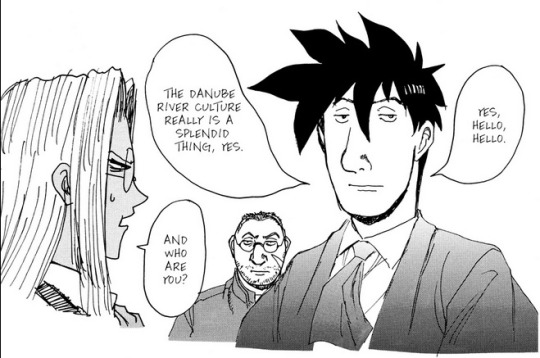
Okay so first off, I wanted to document this cool trivia I noticed about Rip van Winkle, the werewolf(?) with the musket that fires magic bullets. Her weapon is based on the 19th Century German opera Der Freischütz. The opera is based on a story published by Johann August Apel in 1811, and this writing was based on German folklore. The legend involves a marksman who makes a contract with the devil and receives seven magic bullets. Six will hit whatever the marksman wants, but the seventh is at the sole discretion of the devil himself. In Hellsing, the Major speaks to Rip about her own musket and reminds her that the opera ends with Zamiel, the devil, coming to claim his due. This is intended to foreshadow Alucard counterattack on the H.M.S. Eagle, where he plows through Rip’s defenses and kills her in gruesome fashion.
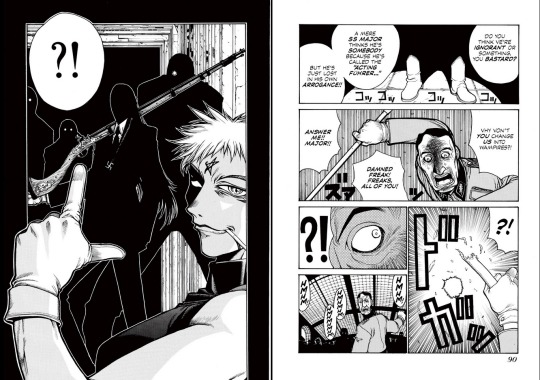
So I went back and counted all the times Rip van Winkle shoots her musket, just to see if there was any special significant to it. The first was when the old Nazi officers complain to the Major, and Rip shoots the Colonel’s cane before he can strike the Major with it. At least, I’m pretty sure that was the idea here. The cane breaks and everyone looks around and Zorin points to the lady with the gun to indicate who just did that. So that’s one bullet.
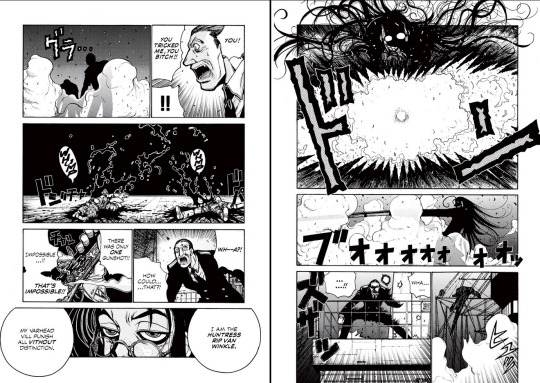
After assuming control of the H.M.S. Eagle, Rip van Winkle meets with the Eagle’s first officer, who betrayed the crew to Millennium in exchange for vampire powers. She then betrays him and his fellow traitors, killing them all with a single shot from her musket. This is where we first find out what her ability is. So that’s two.
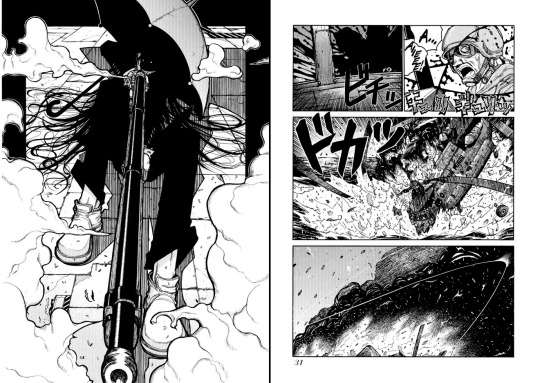
The British Navy tries to take back the ship by sending a helicopter full of SEALs, but Rip destroys the entire team with another shot from her musket. So that’s three shots fired.
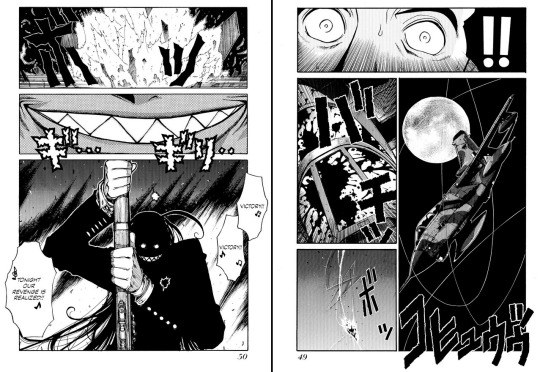
While Hellsing prepares their own response, the Navy tries again, this time sending a fighter plane to sink the Eagle with missiles, but Rip shoots down the missiles and the plane with one bullet. Four.
This is where I started to wonder if there was a particular pattern to Rip’s use of the musket. I’m pretty sure she just uses one bullet and can fire it as many times as she pleases, but she was literally singing songs from the opera and it seemed kind of superfluous to have her foil two separate attack by the Navy. The first one showed us that conventional forces wouldn’t get the job done, so the second one only makes sense if Kouta Hirano was just trying to add to the count.
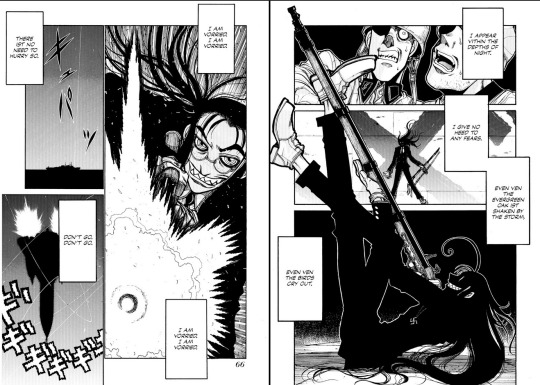
Then Alucard arrives aboard a modified SR-71 Blackbird. At 85,000 ft in the air, he’s out of range, but then he nosedives onto the deck of the ship. Rip fires again to destroy the Blackbird before it crashes into them. Five.
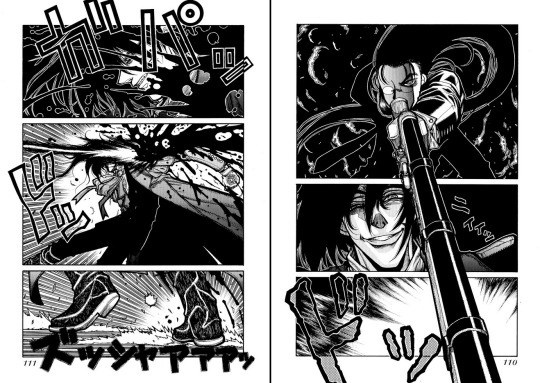
Alucard survives the crash and wipes out all of Rip’s soldiers while she has a panic attack. Cornered, she finally gathers her wits and attacks Alucard. Her bullet hurts him, but he eventually catches it in his teeth, neutralizing her weapon and leaving her at his mercy. That’s shot number six.
I was hoping this shot would be the seventh, since the seventh bullet in Der Freischütz belongs to the devil, and Alucard caught this one in his teeth, but no. Then I remembered that the musket gets fired one last time...
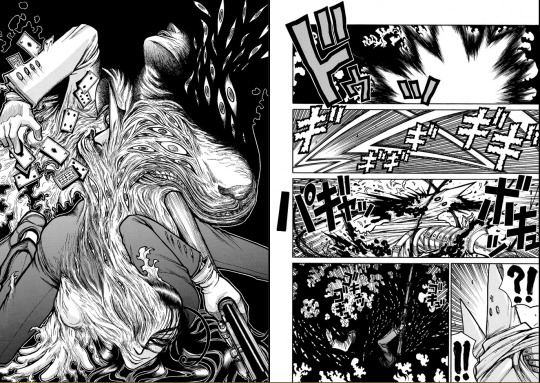
... in London, when Alucard releases the familiars of all the victims he’s consumed over the centuries, including Rip Van Winkle. She fires the musket once more, but this time it’s Alucard directing the shot into the helicopters of the Ninth Crusade. Shot number seven is at the discretion of the devil himself, and “Dracula” is a diminutive of “Dracul”, a Romanian word for “devil”. Neat stuff.
Okay, so now let’s talk about Seras, because that’s kind of my jam. What’s the deal with this line? “Her existence is somewhat of a marvel. You could say it’s somewhat of a joke. Perhaps she herself has not even noticed yet!!”
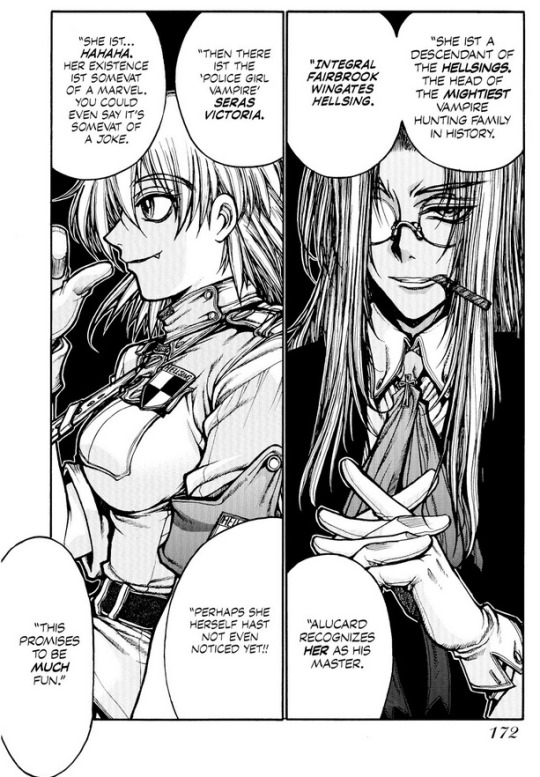
That’s the Major discussing Sir Integra and Seras in Volume 5. He stresses that neither is to be underestimates, and I think he makes a good case for Integra, but with Seras he never actually comes to the point. So what’s up with that?
Of course, there’s the truth we saw in the final battle. Once she finally drank blood of her own volition, Seras became a full-on vampire and one of the most powerful warriors on the field. She destroyed the Captain quite handily, and he was the strongest guy Millennium had. But this seems a tad obvious? Why not just spell it out for Zorin. “Hey, our intel says she’s weaker than expected because she won’t drink blood, but that could change at a moment’s notice, and she’s still strong enough to take down a lot of our soldiers, so proceed with caution.”
I’m not saying the Major is wrong. He told Zorin not to engage, and he made the right call. I’m just wondering what the “joke” is exactly.
I think it might be one of two things. By the end of Hellsing, Seras demonstrates a similar level of ability to Alucard. Sunlight appears to have no effect on her, she can summon familiars like Alucard, and regenerate her wounds with great alacrity. I’m pretty sure she’d be about as hard to kill as Alucard himself, which Integra said was a product of Hellsing “enhancements”, rather than natural vampire power. Except Seras was never “enhanced”, she seems to have just inherited these “super-vampire” powers from Alucard when he turned her. The Major and Doctor may have anticipated this, and the “joke” was that Seras could completely upset the balance of their plans, except she’s too squeamish to drink the blood that would make this possible.
Or, the joke might be that Alucard turned Seras at all. He just sort of did this out of nowhere, and I’m pretty sure no one saw that coming. Millennium and Walter had been keeping tabs on Hellsing for decades, and not much changed until Alucard decided to add Seras to the group. The vampires in Millennium’s Last Battalion were all produced through the Doctor’s artificial vampire research, which was based upon intense study of Mina Harker, the last person Alucard turned into a vampire before he met Seras.
So from that standpoint, Seras represents a superior version of Mina, who represents the ideal that the Doctor was trying to achieve. At best, his finest artificial vampires could only be as strong as Mina Harker, and Seras got that way in one night by a twist of fate.
I guess there’s no way to be sure what the Major meant. I checked the OVA subs and dubs and they basically repeat the same line, so there’s nothing for me to triangulate there. And maybe it only refers to Seras being a joke in the sense that she was mostly comic relief up to that point. Even that badass moment she had against Jan Valentine’s ghouls probably didn’t impress anyone at the Millennium office.
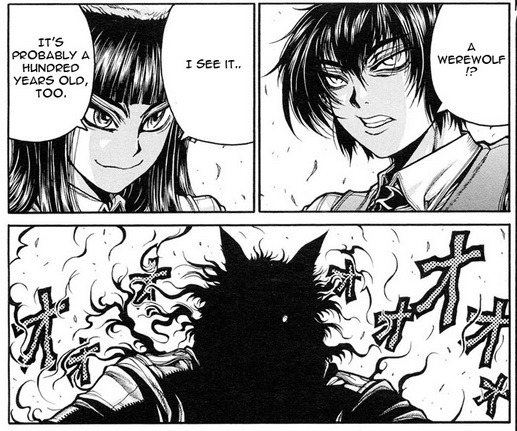
Finally, I checked out Hellsing: The Dawn, and it really wasn’t worth the trouble. I couldn’t find any official English release, so I sort of gave up on it, but I finally ran across it last week and decided to check it out.
Basically, it’s only six chapters, and very little actually gets done in those six chapters. I’m not sure if Kouta Hirano is just running super late on the thing, of if he abandoned it completely, but my guess is he got this far in and decided there really wasn’t any point in continuing.
Let me break it down for you.
Chapter 1: Walter is sent to the Major’s facility in Warsaw, to destroy the vampire research. He jumps out of a plane with Alucard’s coffin.
Chapter 2: The Doctor reports on his progress to the Major, and they briefly discuss “She” aka Mina Harker. From what I gather, Mina is still alive/undead in 1944. Then Walter crashes into their facility and declares his intentions to kill them all.
Chapter 3: The Major is impressed with Walter’s power and offers him a place in his command. Walter refuses and the Major leaves him to die at the hands of the Captain.
Chapter 4: Walter fights the Captain, and Alucard finally emerges from his coffin in Girlycard form.
Chapter 5: Walter and Alucard fight the Captain, who now stands revealed as a werewolf. The Major somehow recognizes Alucard on sight and takes an interest in observing the battle.
Chapter 6: Alucard leaves to go hunt down the Captain’s superiors, leaving Walter to fight alone. Alucard then encounters Rip van Winkle and defeats her with ease. He seems like he’s about to kill her when some menacing figures approach from the shadows...
In other words, not a whole lot actually happens that we couldn’t have guessed from the original Hellsing manga. At the rate he was going, it would have taken Hirano maybe 30 or 40 chapters to actually get to anything truly juicy, and I’m not sure the audience would have wanted to wait around for that. The main problem is that we already know how this ends. None of the good guys or bad guys die, because they all show up in Hellsing 55 years later. The Major will lose badly enough that he has to evacuate the whole operation to Brazil, and that interests me because somehow he has to lose this battle, but not so badly that he can’t escape.
What disappoints me is that there’s really only three things of interest about this part of the Hellsing mythos: Walter’s decision to betray England, Alucard’s relationship with Walter, and the Major’s relocation from Euope to South America. The Dawn appears to gloss over all of these. The Major asks Walter to switch sides in their very first encounter. Walter refuses, but we know he’ll say yes later, so there doesn’t feel like there’s any conflict to this. So far, Walter comes off like a little shithead, so if he changes his mind at the end of this story it’ll seem completely capricious. I’d like to think the Major could say something persuasive to convince him, or Alucard could piss Walter off enough to push him into the Major’s arms, but none of that seems to be happening.
The Girlycard form is taken completely for granted. Al shows up and Walter immediately takes offense. He knows Alucard doesn’t normally look like this and he sees no reason for this new look. Al just says the same thing he says about it in 1999, that form and appearance mean nothing to him. Well if it doesn’t mean anything to Alucard or Walter, what’s the point?
The way I always imagined it, the Girlycard form had a lot of emotional baggage for Walter. I figured he met Alucard in this form, and they spent some time together hunting down the Major. Walter fell in love with Girlycard, even though he should have known better, and when Alucard finally abandoned the form, he knew that there was no way his feelings would ever be returned. And this would build resentment within Walter, making him more interested in joining the Major.
Instead, none of that seems to be happening. This is just one big long fight in one building. Hirano already threw his biggest gun at Walter, so there’s no buildup to the Captain. Alucard won’t fight the Captain, but it’s unclear what else he’s supposed to do instead. There might be a good story in all of this, but these first six chapters don’t encourage me. Also, they keep jumping over to check in on Arthur Hellsing in London. I don’t think this guy is Integra’s father, but maybe her grandfather had the same first name? He looks cool, but he has nothing to do. He’s like thousands of miles removed from the action, so anything he says or does just comes back to him talking about how tough and cool Walter is. So yeah, I think The Dawn is a huge waste of time, and maybe Kouta Hirano reached the same conclusion.
And... yeah, that’s all I’ve got. In May, I’ll be liveblogging another comic. Will it be as successful? Only time will tell...
#2021hellsingliveblog#hellsing#hellsing: the dawn#alucard#rip van winkle#seras victoria#walter c dornez
36 notes
·
View notes
Text
so to elaborate on this-
let me preface this with:
Czech is quite a complicated and also a very colorful (Slavic) language
I do have to add that the Czech dub for KCD2 is *chef's kiss* it's SO well done. it's so colorful and so witty and funny. I encourage any Slavs to at least check out the cz dub + eng sub option
I haven't seen the playthrough in English properly so feel free to correct me if I missed anything
I'm experiencing the game in Czech dub + sub
this is a subjective interpretation of the diminutives used in the Czech dub and the levels of intimacy/affection they carry, a different Czech person may have different experiences with these names
(spoilers ahead obviously, but not anything beyond the Trosky map/part of the game)
for this I'm gonna focus on our lads, Hans and Henry and the Czech versions of the names and their use in the game/dialogue, and two scenes that stood out to me so far - 1st is the cutscene after the lads get jailed at Trosky and they learn that Hans is to be hanged, 2nd is the sequence of gameplay and cutscene during the abovementioned scramble after they get ambushed on their way from Trosky to Nabákov
firstly, the lads and their names
so in the English dub our lads are called Sir Hans Capon and Henry of Skalitz, and as far as i know, Henry only calls Hans either "Sir Capon", "Sir Hans", or "Hans"
in the Czech dub, our lads are called Pan Jan Ptáček [pan jan ptɑː(tʃ)ek] and Jindřich ze Skalice [jɪnd(rz)ɪ(kh) ze skalɪ(ts)e] - the meaning of the words mirror the English equivalents (aka Pan = Sir, ze = of etc.)
going forward I'm gonna use the term "hypocorism" as a blanket term for terms like "informal name", "diminutive", "nickname", "pet name", and the term "formal name" when referring to either an "official" name of the character or (eg. Hans) or a formal given name in the linguistic sense
Jindřich (Henry)
as far as the diminutives of the name Jindřich (Henry) go, there's mainly "Jindra" [jɪndra], which is a fairly basic hypocorism of a formal name - Jan (Hans) uses it quite often for him (as can other characters and do so quite often), which isn't that surprising given Jindra's social status and Jan's and his dynamic, aka Jan doesn't have to stick to respectful and formal names and terms when addressing Jindřich, he could more or less call him whatever
in the English dub, I'm not sure Hans ever calls Henry a nickname(?)
Jan (Hans)
before we get into the hypocorisms, a fun(?) quick(?) aside:
the name Jan in Czech is a formal name, as can Hans be in English of course, but the direct Czech equivalent of the name Hans is "Honza" which, while it technically can(?) be a formal name (there are only 7 people with Honza as their given name in the Czech Rep out of almost 11 million), it is pretty much exclusively a hypocorism of the name Jan - if you're wondering, the direct English equivalent of the name Jan is John (or German Johannes)
with that said, I'm only going to be looking at the way the name Jan and its hypocorisms are used in the Czech language without relating them back to Hans (as Hans is simply the characters formal name in the English dub)
and again, I'm not sure Henry ever calls Hans a nickname(?) in the English dub, but most importantly for this, he doesn't do so in the instances when Jindřich does so in the Czech dub
so as far as I've noticed, there has only been one instance (so far) where the Czech dub uses hypocorisms of the formal name Jan, and we get two of them basically in one scene/sequence - the 2nd scene I listed at the beginning - "Jenda" [jenda] and later "Honza" [honza] which, and this is where it gets subjective in my opinion, is a wild choice from the writers??
Jindřich using hypocorisms for Jan is more significant for obvious reasons, which I already mentioned - the class differences and their dynamic, Jan is a Lord and Jindřich his company, and the latter should keep up the formal and respectful manner when addressing his Lord etc etc, the game tells you this repeatedly in various ways
so, Jenda is pretty much a direct hypocorism of the name Jan, but heavily informal, it has a "silly factor" if you will, it's a Very lighthearted diminutive, kinda goofy, one would use it, in my opinion, for a young-er friend (good friend) or in a teasing manner, or as an affection charged nickname, familial, familiar or romantic
Honza is a bit complicated to explain, it's also a hypocorism of Jan, but it's far more often used than Jenda, and while still informal it doesn't have the goofy factor and silliness to it and may as well be used as a regular (nick)name instead of the given name Jan
why this matters - Czech hansry truthers have been blessed
now, both of these are far from inherently overtly affectionate (or romantically charged at that) - However, as is established, Jindřich should have no business calling Jan, his lord, any sort of nickname (or even just calling him only by his first name, as he does in the 1st scene mentioned at the beginning, more on that below), and the fact that he does so in moments of desperation where Jan is in great/grave danger is. insane of the writers tbh
and this is the first time Jindřich uses these for Jan as well, he just shouts them out, too, the voice actor (Richard Wágner) did an absolutely fantastic job, those hypocorisms are loaded with emotion
and again, as far as I've been able to find, there hasn't been any use of hypocrisms or nicknames in the English dub between these two
lastly, to circle back to the scenes - the 1st scene in jail at Trosky, Jindřich just shouts "Jane!" after him and it caught me SO off guard because this was the first time in the sequel (and possibly the first or second time over both the games) Jindřich called Jan only by his first name, no title, no last name, just Jan, and it was while Jindřich was being dragged away from him, both having just learned Jan is to hang in 12 hours. the 2nd scene the lads have been ambushed by guys with pistols(!)(I hereby invite you to look up what the origin of the word "pistol" is lol), Jan keeps disappearing from Jindřich's sight and then he gets whacked in the head and stays unmoving on his back and Jindřich has to shake him back into consciousness while they get surrounded. I have rewatched both scenes at least 15 times each, I am losing my mind
I genuinely am unable to fully express just how intimate the "Honzo!" is when Jindra is cradling Jan's head, shaking him awake desperately. like,, the "Jane!" was already a shock, and then this. I am so serious when I say I screamed
in my humble opinion these are very deliberate choices on the writers' and directors' part and I'm still in awe from just how well and sensibly and delicately they developed their relationship and even crafted a romance option that feels completely normal, even natural for these two characters. I still cannot understand or comprehend how this even happened at Warhorse (given Vávra and his very vocal opinions, no less) and that we have this tastefully crafted and handled gay romance in a Czech medieval videogame. speechless (he says, after finishing his extensive speech asdjlhkhaskhgsjkadhl)
you guys. in the czech dub of the game, henry calls hans nicknames and more importantly, diminutives during the scramble after they get ambushed on their way to nabákov. im. soft
#t4lx.txt#kingdom come deliverance 2 spoilers#kingdom come deliverance spoilers#kcd2 spoilers#kcd czechposting#i hope this makes sense!#good luck with ř#hansry#if you have any questions of would like me for some reason to elaborate more or on something else. sure! lmao#tags from og post cause i wanna#no diminutives in the english dub mind you!! i checked!!#czech hansry truthers we win again in a new way#LIKE. FYM#JANDO#HONZO???????#THE WAY I SCREAMED#i still CANNOT fucking believe this is actually happening.#mr wágner doing the lords work as jindřich#and also whoever at warhorse wrote those dialogues and made the decisions to put those diminutives there. Perfection#made the scene even more loaded with feelings and worry and protectiveness and also communicated that the lads relationship is way more th#than just lord and servant. im this essay i will start sobbing if i keep thinking about them at this point#addition#IF THEY END UP DROPPING “JANEK” IN THERE I WILL START CRYING. IT IS A THREAT AND A PROMISE#so. fellow čumblr kcd(2) enjoyers how are we doing#also i am headcannoning this right now. Jindra calls my mans Honzík when noones around. it is truth. it is written#Vávra told me himself. in a fever dream but he told me nonetheless
73 notes
·
View notes